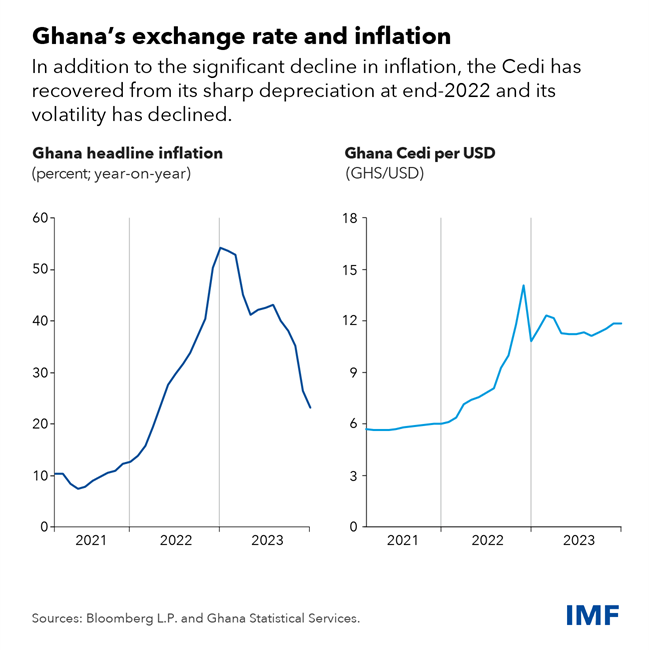Ghana: Transforming a Crisis into a Journey Toward Prosperity
January 29, 2024
Ghana is making important inroads to stabilize its economy, and continued program implementation beckons a brighter future
When Ghana requested an IMF-supported program in July 2022, the country was dealing with an economic and financial crisis that was the outcome of preexisting vulnerabilities and substantial external shocks. The authorities have since made compelling progress under the program that was approved by the IMF Board in May 2023.
Two years ago, elevated fiscal deficits and public debt levels, together with the combined effects of the COVID-19 pandemic, Russia’s war in Ukraine, and global monetary policy tightening, triggered a drop in international investor confidence in Ghana, resulting in a loss of international market access. This generated increasing pressures on domestic financing, with the government turning to monetary financing by the central bank, which fed into declining international reserves, currency depreciation, and accelerating inflation.
Now, the Ghanaian economy is showing signs of stabilization thanks to the authorities’ steadfast implementation of its IMF-supported economic program, which aims to restore macroeconomic stability, secure debt sustainability, and lay the foundations for higher and more inclusive growth.
Policy and reform commitment under the program
The Ghanaian authorities have been taking bold steps to restore macroeconomic stability, including through their budgets for 2023 and 2024 which emphasize fiscal consolidation and sound public finances. These efforts are underpinned by structural reforms aimed to enhance domestic resource mobilization, strengthen public financial management, and create a business environment that better fosters private sector development. This is all geared toward securing durable macroeconomic stability, catalyzing growth, and ensuring a fairer distribution of its rewards among Ghana’s people.
Alongside this, the Bank of Ghana has appropriately increased interest rates and eliminated monetary financing of the budget. Although inflation remains high, it is headed in the right direction: down to 23 percent in December 2023 from a record high of 54 percent in December 2022. The Bank of Ghana is determined to maintain policies that will continue to bring inflation down to levels consistent with their inflation targeting framework. The authorities have also designed a solid plan to ensure financial sector stability.
While the authorities’ fiscal efforts will be instrumental in ensuring long-term debt sustainability, the government also launched a comprehensive debt restructuring operation in December 2022. This includes a domestic debt voluntary exchange, which has been successfully concluded, and two external debt operations, one with official bilateral creditors and the other with commercial creditors. Under the G20’s Common Framework, the Ghanaian authorities have recently reached agreement in principle with their official creditors on a debt treatment consistent with the program parameters. They are also engaging their external commercial creditors to seek their support.
Turning the corner: early signs of stabilization
Performance under the program has so far been compelling, with signs of stabilization emerging and the economy turning the corner. Despite a difficult global economic environment, growth in 2023 has shown resilience. Alongside this and the significant decline in inflation, the currency has recovered from its sharp depreciation (by 45 percent vis-à-vis the US dollar) at end-2022 and has been less volatile, with international reserves increasing.
This is thanks to steadfast policy implementation around aligning the budget with the program, meeting program targets (especially net international reserve accumulation and primary fiscal balance), and carrying out key structural reforms, especially in the financial and the energy sectors.
The social dimension: efforts to protect the vulnerable
In undertaking bold reforms to overcome an economic crisis, it is crucial to safeguard vulnerable people, and the Ghanaian authorities are working hard to expand the most effective social protection programs. In 2023, they doubled the benefits under the existing targeted cash transfer program, the Living Empowerment Against Poverty, and these benefits are expected to be doubled again in 2024, increasing the benefit coverage from about 6 percent to 12 percent (of household pre-transfer consumption)—and helping to significantly reduce poverty and inequality.
In the education sector, allocations toward the Ghana School Feeding Program and the Capitation Grant also received a boost. And, in the health sector, the authorities have expanded the allocation to the National Health Insurance Authority by over 40 percent to cover medical claims, essential medicines, and vaccines for the most vulnerable. These are critical interventions to protect the vulnerable which are regularly monitored under the IMF-supported program.
The path forward
Looking ahead it is important for Ghana to lock in the gains so far and continue steadfast implementation of the program, despite challenges associated with potential external shocks and the political environment in the run-up to the 2024 Presidential and parliamentary elections.
Sound policies are expected to foster the recovery, bringing economic growth back to long-term potential and protecting the vulnerable, while inflation is projected to decline further. And fiscal consolidation and the completion of the debt restructuring operations would ensure that public debt is brought back to a sustainable trajectory. If the authorities continue to implement their package of policies and reforms with the commitment and drive demonstrated so far, sustained implementation of the program promises to bring a brighter future to all Ghanaians.
****
Leandro Medina is the IMF Resident Representative in Ghana.









